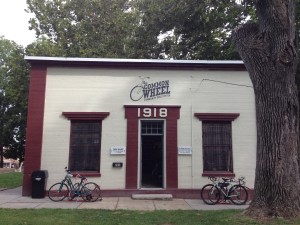The community bike shop concept was what spurred Chris Caldwell to action about two years ago. He had no bike mechanic experience, so opening a conventional bike shop was never on his mind. “Basically I had read about community bike shops as a model, and was interested in that aspect — the community-building aspect — of it as an alternative to traditional bike advocacy. Something you can actually get your hands into.”
Caldwell’s idea to open a community bike shop in Lancaster, Pennsylvania, where a positive bike culture and bike infrastructure is just beginning to take hold, had timing on its side. Within a week of deciding it was something he wanted to take on, Caldwell joined a downtown coworking space, and was alerted to an information session for the first round of The Great Social Enterprise Pitch, a program set up by the Lancaster County Community Foundation, which makes grants, and holds fundraising events to support local non-profits. He went to the session, spoke about his idea for the first time publicly, and was committed and on his way to bringing The Common Wheel to life. Along the way to winning the pitch contest, Caldwell met a number of people who were instrumental in helping him get the project off the ground, including some of whom would eventually go on to become board members of The Common Wheel. In addition to the people he met, the prizes — cash and in-kind assistance — from the contest came at just the right time for the fledgling enterprise.
The Common Wheel’s mission is “… to encourage bicycling in Lancaster by creating a fun, welcoming space where we provide access to hands on education and tools to all members of the community.” This mission is fulfilled, in part, by classes for children and adults, and by providing space and access for members of the community to be able to become more familiar with how their bikes work, and how to keep them on the road.
The flagship program at The Common Wheel is a summer and after-school Earn-A-Bike program for kids. The program runs in six-week sessions, twice a week, for two hours. Kids choose a bike that fits them at the beginning of the session, and by the end of the six weeks, they have worked on every system on the bike, overhauled it completely, and have gotten a little road-time under their belts. They walk away with a bike, helmet, lock, and t-shirt, and a set of skills they can continue to use in the future. The Common Wheel has hired one of its Earn-A-Bike graduates to help part-time in the shop, and another has been hired by a local conventional bike shop.
Beyond giving city residents hands-on experience fixing their bikes, The Common Wheel is affecting bike culture and bike infrastructure in other ways as well. It has teamed with local social service agencies to provide bikes to people with no other means of transportation, so that they have a way to get to and from work. Caldwell also serves on the Coalition for a Bike Friendly Lancaster — currently as Interim Chair — which works to advance the cause of Bike culture and better bike infrastructure in the city, by working with and advising the city on infrastructure. “We’re working on a variety of things. Building a broad base of support, advising the city on how to go in terms of infrastructure, as well as outreach and encouragement.”
Caldwell and The Common Wheel also organize group bike rides through the city, and advise other ride organizers. As he explains, “It gets people together and hopefully [will] be something we can work off of to get a group together to help fight for change. That’s partly what was missing from the culture here. Everyone was getting bogged down in some of the policy and some of the stuff that’s not so much fun, and having an outlet where people can come and realize that bikes are great for many reasons, but also just fun is a big aspect of it.”
Moving forward, Caldwell expects The Common Wheel to keep doing much of what it has been doing thus far: getting city residents on bikes, on the road, and engaged in the process of making sure that riding becomes safer and more prevalent in a city which could benefit from getting more people on their bikes and out of their cars.
Faith Kelleher Gaddie is a freelance writer based in Lancaster, Pennsylvania

